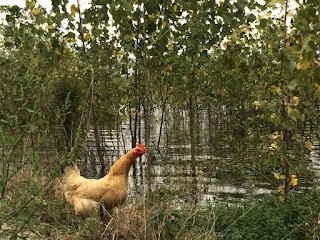A student of mine1 just wrote a great comparison and contrast between two recent works of Chinese American literature: Ken Liu’s “The Paper Menagerie” and Alyssa Wong and Wendy Xu’s “The Auntie.” You could call the topic “Maternal Influences on Ethnic Identity Amongst Chinese American Youth.” Both stories are available here:
- Kenneth Liu. “The Paper Menagerie.”
- Alyssa Wong and Wendy Xu, “The Auntie.”
My course is titled “Chinese American Literature.” It has several aims:
- To explain “Chinese” as a floating signifier, and to contextualize “Chinese identity” as a specific construction according to place, time, and society, both as a choice and as an imposition;
- To expose students to American literature written by authors of Chinese descent (and, backhandedly, to show students that “American literature” goes beyond typically canonized authors like Mark Twain or Ernest Hemingway, and very much includes “people like them”);
- To expose students to multiple historical experiences of Chinese in America, from 19th century railroad workers to the Chinese Exclusion Act to the Immigration Act to increasing transnationalism, thus rendering “Chinese” a diverse, political, and time-bound experience; and
- To understand “Chinese” and “Western” identities beyond Orientalist binaries of East-West opposition, and reconstruct new modes of identification based on syntheses and dialogues formed in the Chinese American experience (ie: what does it mean to be Chinese AND American?)
Here are a few of the student’s claims. I’ve admittedly cleaned up and condensed the language for your reading convenience:
- Both the Auntie in Wong & Xu’s “The Auntie” and Jack’s mother in “The Paper Menagerie” behave maternally toward Chinese American youth, but the Auntie takes a much more authoritarian approach, while Jack’s mother is more passive and accommodating.
- Many of the Auntie’s interactions take the form of direct advice and “imposition.”
- I really like how the student pointed out the Auntie’s neck as a graphic metaphor to depict this behavior. The Auntie literally “sticks her neck into” her young relative’s affairs (my addition):

- Jack’s mother, in contrast, follows her child’s every whim, in the hopes of passing “Chineseness” onto him through service.
- Here’s a sample from the student’s essay: “The mother also tried to cultivate Chinese ethnicity by satisfying Jack’s requests…. It is true that the mother made Jack’s first paper menagerie – Laohu, at her own decision, but this was to introduce the paper menagerie to him; actually, most of the paper menageries he played were decided by himself. For example, the mother made a shark for him after “[Jack] saw a TV documentary about shark and asked [her] for one” (Liu).”
- Both the Auntie and Jack’s mother take on a “life-after-death” condition. The Auntie is a ghost throughout Wong & Xu’s entire story, while the mother dies figuratively, then corporeally through “The Paper Menagerie.”
- As ghosts, they become “disembodied,” taken out of their family conditions and their real societies around them. As my student says, “One of the key reasons Jack grows estranged from his mother is because “other families don’t have Moms who don’t belong” (Liu); in other words, other families don’t have Chinese mothers. If the mother is invisible, others would only see Jack’s father, who was American, just like most other fathers.”
- As extremes toward either end of a spectrum, both characters fail to establish a healthy ethnic identity toward younger Chinese Americans.
- These extremes lead youth to reject their ethnic identity until greater experience and immersion into mainstream American culture allow them to revisit their ethnic identity on their own.
The later part of the paper diverges into explorations of both protagonists’ reactions toward their elders and their gradual acceptance of their ethnic identity, but the premises of the paper remain clear.
One of the delights about teaching talented students is they push you into new and more disciplined insights into your own work. I think further about the presence of Asian mothers in American culture and society. Their relative invisibility (as mothers) in the American public. Their influence and authority within the domestic sphere. I also wonder over the extent of that sphere: National? Municipal? Community? Ethnic? Or just within the American nuclear household? I hear many accounts of Asian American men describing their complex yet honor-and-loyalty bound relationships with their mothers (ie: Changrae Lee in “Coming Home Again”).
The student’s essay also mentioned the impact of mothers on Chinese (Asian) American youth. Both “The Auntie” and “The Paper Menagerie” are, from their respective narrator’s point of view, very much 21st century stories. I think of the Asians who came to the United States after the Immigration Act of 1965 as young adults. I think of their children, growing up during the more conservative 80s and 90s, amidst the heights of America’s Cold War hegemony. And now I think of these children, post-Immigration Act, second-generation Asian Americans, who are now having children of their own. Young Asian American mothers and fathers of the 2020s, now two (or more) generations of American-born citizens, possibly two (or more) generations removed from their families’ countries of origin.
I imagine many from within and without various Asian American groups view older generations of motherhood as a dynamic of orientalized binaries. Between tradition and modernity, abject visibility versus acquiescent invisibility, public face versus domestic strife, authority versus accommodation, shelter and safety versus risk. Yet, especially with the 21st century’s rise of East Asian economies and transnational identities, such binaries no longer hold such conceptual weight. In other words, the younger generations, those tellers of Asian American stories, those creators of Asian American art, the builders of community will themselves become parents. The young American-born Asians themselves become those figures of authority, inspiration and anxiety that shape so much of Asian American identity. What happens when Jin Wang of Yang’s American Born Chinese becomes a father? Who are the descendants of Moonshadow of Yep’s Dragonwings?
I do wonder what new subjectivities Asian American mothers will express over the new decade.
Of course, I also wonder what new subjectivities Asian American fathers will express as well. That is a whole entire other discussion.
I won’t presume to speak for the Asian American women I know (or don’t know). But I do know, as a hope-to-be dad, I am going to fall into exactly the same stereotypes I had about Asian dads when I was a kid. “Spilled your milk on the table again? 打2,3!”
And that lucky kid’s mother? She, of course, would respond somewhere between, “How dare you hurt our precious offspring!” and “I appreciate you disciplining that turd. 💩”
Take care everyone, and have a nice day! 😃 🌇🏝🌹💕☀️
1: Zhang, Leyang. “On Women’s Formation of Chinese Ethnicity for Child.” July 30, 2020. Vr293: Chinese American Literature, Shanghai Jiaotong University – University of Michigan Joint Institute, Student paper.
2: 打 = da3 = to-hit-firmly-but-without-physical-damage-so-as-to-let-my-boy-know-‘you-are-a-fool-and-need-to-learn-righteous-behavior’
3: Unless we have a daughter. In which case I forgive everything and continue to spoil her rotten.













